比较级和最高级和短语、句型
比较级最高级的用法
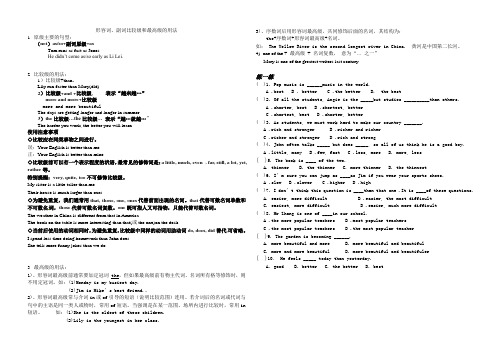
形容词、副词比较级和最高级的用法1. 原级主要的句型:(not)as/so+副词原级+asTom runs as fast as Jones.He didn’t come as/so early as Li Lei.2. 比较级的用法:1)比较级+than。
Lily run faster than Mary(did).2)比较级+and +比较级, 表示“越来越…”more and more+比较级more and more beautifulThe days are getting longer and longer in summer.3)the比较级…the比较级…表示“越…就越…”The harder you work, the better you will learn.使用注意事项◇比较应在同类事物之间进行。
误:Your English is better than me.正:Your English is better than mine.◇比较级前可以有一个表示程度的状语,最常见的修饰词是:a little, much, even,far, still, a lot, yet, rather等。
特别提醒:very, quite, too不可修饰比较级。
My sister is a little taller than me.Their house is much larger than ours.◇为避免重复,我们通常用that, those, one, ones代替前面出现的名词。
that代替可数名词单数和不可数名词,those代替可数名词复数。
one既可指人又可指物,只能代替可数名词。
The weather in China is different from that in America.The book on the table is more interesting than that(或the one)on the desk.◇当前后使用的动词相同时,为避免重复,比较级中同样的动词用助动词do, does, did替代,可省略。
比较级和最高级和短语、句型
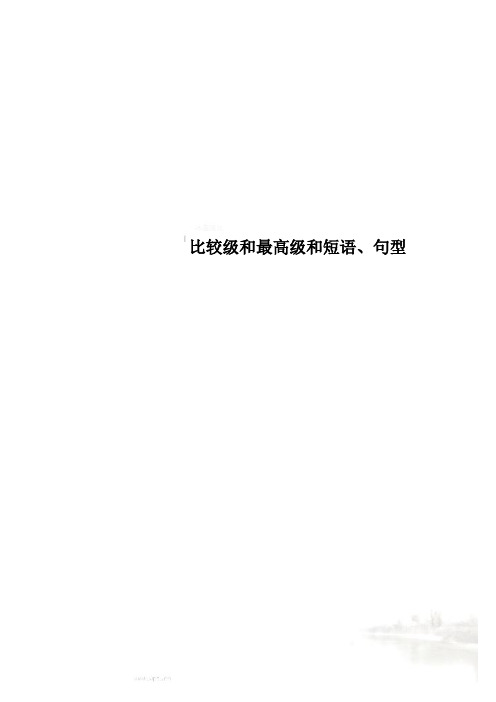
比较级和最高级和短语、句型疑问词:When where which which season which month which gamewhich sport which subject what who whose how many how muchHow long how old how tall how heavy表示时间的词usually always often some time hardly ever never表示过去时间的词this morning this afternoon this evening this noonlast morning last afternoon last evening last noon last year last monthlast week last Monday last Tuesday last Wednesday last Thursdaylast Friday last Saturday three years old three days old last Sundaythree mouths old the day before yesterday表示将来时间的词will: tomorrow next year next month next week next day next Sundaynext Monday next Tuesday next Wednesday next Thursdaynext Friday next Saturday表示时间的词today now every day twice a day every week every mouth every yearonce a year twice a mouth数词One1 two2 three3 four4 five5 six6 seven7 eight8 nine9 ten10 eleven11 twelve12 thirteen13 fourteen14 fifteen15 sixteen16 seventeen17 eighteen18 nineteen19 twenty20 twenty---one21 thirty30 forty40 fifty50 sixty60 seventy70 eighty80 ninety90one hundred100序数词first 1st second 2nd third 3rd fourth 4th fifth 5th sixth 6th seventh 7th eighth 8th ninth 9th tenth 10th eleventh 11th twelfth 12th thirteenth 13th fourteenth 14th fifteenth 15th sixteenth 16th eighteenth 18th nineteenth 19th twentieth 20th twenty---first 21st thirtieth 30th thirty---first 31st星期Sunday Monday Tuesday Wednesday Thursday Friday Saturday月份January February March April May June July August September October November December人称代词I you he she it we you they物主代词my your his her its our your their mine yours his hers its ours yours theirs 宾语me you him her its us you themUnit 1:1 I had a dream2 last night3 on Mars4 in /my/his/her dream5 in a spaceship6 in space7 many stars8 very cold 9 had a lot of fun10 had a fun11 had a good time12 had some fun13 at home14 at school15 at the supermarket16 at the park17 at the busstation18 at the movie theater19 yesterday afternoon20 a good movie21 had an English class22 in the kitchen 23on the moon24 from the earth25 this holiday1 我做了一个梦2 昨晚3 在火星上4在我的/他的/她的梦里5 在宇宙飞船里6在太空7许多星星8非常冷9过的愉快10过的愉快11过的愉快12过的愉快13 在家14 在学校15 在超级市场16在公园17在公共汽车站18在电影院19昨天下午20一场好的电影21有一节英语课22在厨房23 在月球24来自地球25 这个假日26 in Beijing27 in a library28 yesterday evening29 last week30 In the hospital31 had no brother/sister32 had no money33 had no food for dinner34 lived with…..35 very poor36 very sad37 last SundayUnit 21 come in2 eat breakfast3 yesterday morning4 come to5 very quickly6 very slowly7 made a mess8 look sick9 on the back10 clean the table11 clean the house12 clean the class room13 clean my bedroom14 clean the floor15 visit my friend16 want a banana17 watch TV18 go home /went home19 go to school/went to school20 play football21 go to the supermarket22 eat lunch23 watch a movie24 see a movie26 在北京27 在图书馆28 昨天晚上29 上周30在医院31没有兄妹32没有钱33晚餐没有食物34 和….一起居住35非常穷36 非常伤心37 上周日进来吃早饭昨天早晨来非常快非常快弄脏看上去病了后背擦桌子打扫房间打扫教室打扫卧室扫地看望我的朋友想要一个香蕉看电视回家去上学踢足球去超市吃午饭看电影看电影25 wash his dog26 wash my clothes27 go shopping /went shopping28 wash her socks29 listen to the radio30 listen to music31 the next day32 read the book33 on vacation34 do my homework35 every day36 go to the park37 had a picnic38 in my bedroom39 at seven thirty40 at eight o’clock41 in the evening 42had a bad day 43 go to Ken’s house44go swimming 45go to theswimming pool46want to go swimming47 at last48 in the garden49 next to50 at the table51 look at52 clean my bedroom53 Mocky visit me54 go to Ken’s house55 play with my friendsUnit 31 in some races2 in a race3 win a/the race4 have a/the prize 25洗狗26洗我的衣服27购物28洗她的袜子29听收音机30听音乐31第二天32读书33在假日34做作业35每天36去公园37野餐38在我的卧室39在七点三十40在八点41在晚上42伤心的一天43去ken的房间44去游泳45去游泳池46想去游泳47在最后48在花园49旁边50在桌旁51看一看52打扫我的卧室53Mocky 看望我54去Ken的房子55和我的朋友玩1在一些比赛中2在一场比赛中3赢了一场比赛4有一个奖品5 jump high6 high jump7 win a/the prize8 very well9 in the frist race10 very fast11 very excited12 in the second race13 in the competition14 one hundred15 one thousand16 a swimming race17 climb up18 in front of19 knock at the door20 school sports day21walk into the house22on the table23 at the table24 had a swimming race25 after the race26 a glass of milk27 an hour28 I had a great time29 decided to do something30 after the race 31 by bus32 a glass of milk33 an hour34 beforeAfterin the middle last35went into the living roomwent into the bedroomwent into the kitchenwent into the bathroom36 I had a great time5跳得高6跳高7赢了一个奖品8非常好9在第一场比赛里10非常快11非常激动12在第二场比赛里13在比赛里14一百15一千16一场游泳比赛17向上爬18在。
最高级和比较级的用法

最高级和比较级的用法比较级的用法:1.双方比较表示一方超过另一方时, 用“比较级+than”的结构表示.例如:There are more workers in this factory than in that factory.这个工厂的工人比那个工厂的多.The climate of Dalian is better than that of Shanghai.大连的气候比上海好.The atmosphere of the earth is much denser than that of the moon. 地球的大气比月球的要稠密的多.2.表示一方不及另一方时,用“less +原级+ than”的结构表示.例如:This room is less beautiful than that one.这个房间不如那个房间漂亮.They speak less fluently but more correctly than we(do).他们讲得不如我们流利,但比我们准确.5.表示一方超过另一方的程度或为二倍时,可在比较级前加表示程度的状语.如: even, a little ,still, much, far , yet ,by far, slightly, very much, no, any, rather, a great deal, a lot, lots, a bit等修饰.例如:He works even harder than before.他比以前更加努力工作.There is lots more sugar in the storeroom.储藏室有更多的糖.He was too tired to walk any further.他太累了,再也走不动了.Are you any better than before?你今天比以前好点了吗?That would be a great deal better.那样的话就好多了.The photographs of Mars taken by satellites are much clearer than those taken from the earth.从卫星上拍的照片比从地球上拍的清楚.注意:英语的比较级前如无even, still或yet等时,译成汉语时可用“较……”或“……一些”或不译出,一般不可用“更”.如:She is better than she was yesterday.她比昨天好些了.Please come earlier tomorrow.明天请早点来.注意:by far, far, much 通常用于强调最高级.by far用于比较级时,一般放在比较级的后面.如放在前面,应在二者中间加“the”.far and away, out and away, the very只能用于修饰最高级.如:Building this tunnel was by far the most challenging problem in the system.建筑这样一条隧道无疑是这个系统中最棘手的工程.This is much the best.这是最好的.It is far and away ( or out and away) the best.这是好的无以复加.This is the very best book that he ever wrote.这是他写过的书中最好的一本.8.表示主语随另一方的程度而变化时,用“the +比较级(主语+谓语), the +比较级(主语+谓语)”的结构.例如:The harder he works, the happier he feels.他越努力工作越感到幸福.The higher we went up the mountain, the colder it became. 越往山的高处爬越冷.The more they talked, the more encouraged they felt.他们越说越感到鼓舞.12.不与其它事物相比,表示本身程度的改变时, 用“比较级+比较级”的结构.例如:The weather is getting colder and colder.天气越来越冷.The girl becomes more and more beautiful.这个女孩长得越来越漂亮.The days become longer and longer.天变的越来越长.We are walking more and more slowly.我们走得越来越慢.6. 在inferior(劣于), superior(优于), junior(年幼的), senior(年长的), prior(前面的), posterior(后面的)等后面用to代替than.例如:He is superior to Mr. Wang in mathematics.在数学上他比王先生好.His work is inferior to mine.他的工作不如我的好.He is 2 years senior to me.他比我大两岁.The duty is prior to all others.这项任务比其他任务都重要.7.在比较从句中为了避免重复,我们通常用that (those),one (ones)代替前面出现的名词,that指物,one既可指人,也可指物.that可代替可数名词单数和不可数名词,而one只能代替可数名词.例如:The book on the table is more interesting than that on the desk.餐桌上的那本书比课桌上的那本书有趣.A box made of iron is stronger than one made of wood .铁箱子比木箱子结实.“ the + 形容词的比较级+ of ”例如:He is the taller of the two.他是两个人中较高的一个.She is the more beautiful of the two sisters.她是两姐妹中较美的一个.Of the two landscapes that you have shown me, this one is the more picturesque.你给我看的两处景色中,这一处更别致.8.表示倍数的比较级有如下几种句型:A. A is three (four,etc.)times the size (height,length,width,etc.)of B例如:The new building is four times the size(the height)of the old one.这座新楼是那座旧楼的四倍大(四倍高).(这座新楼比那座旧楼大三倍[高三倍])B. A is three (four, etc.)times as big (high, long, wide, etc.)as B.例如:Asia is four times as large as Europe亚洲是欧洲的四倍大.(亚洲比欧洲大三倍.)C. A is three(four, etc.)times bigger(higher, longer, wider, etc.)than B例如:Your school is three times bigger than ours.你们的学校比我们的学校大三倍.(你们的学校是我们学校的四倍大.)用times表示倍数,一般限于表示包括基数在内三倍或三倍以上的数.表示两倍可以用twice或double.四、最高级的用法1. 三者或三者以上相比,2. 表示最高程度时,3. 用“the + 最高级”的结构表示.这种句式一般常有表示比较范围的介词短语.例如:Zhang Hui is the tallest of the three.张辉是三个人中最高的.He works (the) hardest in his class.他是班级中最用功的学生.2. 最高级可被序数词以及much, by far, nearly, almost, by no means, not quite, not really, nothing like等词语所修饰.例如:This hat is by far/much/ nearly/ almost/not nearly/ by no means/ not quite/nothing like the biggest.这个帽子是最大的.How much is the most expensive computer ?那个价格最昂贵的计算机需要多少钱?3. 表示“最高程度”的形容词,如excellent, extreme, perfect等,没有最高级,也不能用比较级.4. 形容词最高级修饰作表语或介词宾语的名词、代词时被修饰的词往往省略.例如:He is the tallest (boy) in his class.他是班级中最高的男孩.5. 作状语的副词最高级前可以不加定冠词.例如:Of all the boys he came (the) earliest.在所有的男生中他来得最早.。
比较级和最高级
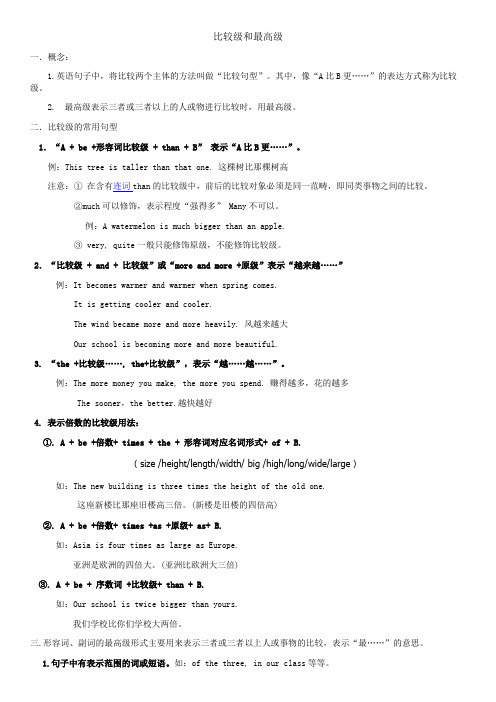
比较级和最高级一.概念:1.英语句子中,将比较两个主体的方法叫做“比较句型”。
其中,像“A比B更……”的表达方式称为比较级。
2.最高级表示三者或三者以上的人或物进行比较时,用最高级。
二.比较级的常用句型1.“A + be +形容词比较级+ than + B” 表示“A比B更……”。
例:This tree is taller than that one. 这棵树比那棵树高注意:①在含有连词than的比较级中,前后的比较对象必须是同一范畴,即同类事物之间的比较。
②much可以修饰,表示程度“强得多” Many不可以。
例:A watermelon is much bigger than an apple.③ very, quite一般只能修饰原级,不能修饰比较级。
2.“比较级 + and + 比较级”或“more and more +原级”表示“越来越……”例:It becomes warmer and warmer when spring comes.It is getting cooler and cooler.The wind became more and more heavily. 风越来越大Our school is becoming more and more beautiful.3. “the +比较级……, the+比较级”,表示“越……越……”。
例:The more money you make, the more you spend. 赚得越多,花的越多The sooner,the better.越快越好4. 表示倍数的比较级用法:①. A + be +倍数+ times + the + 形容词对应名词形式+ of + B.(size /height/length/width/ big /high/long/wide/large)如:The new building is three times the height of the old one.这座新楼比那座旧楼高三倍。
比较级和最高级用法归纳
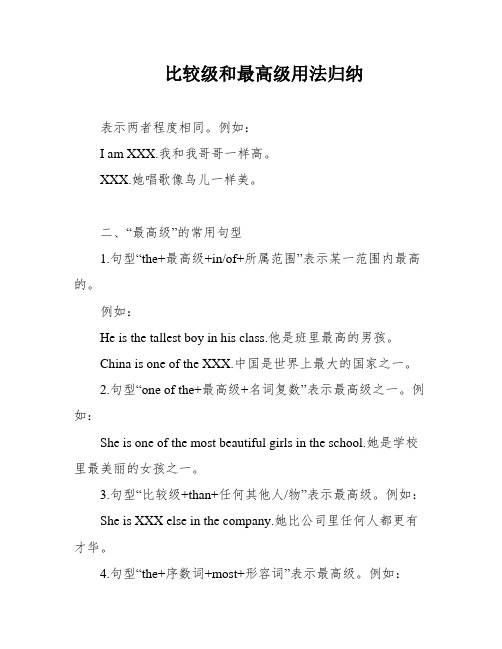
比较级和最高级用法归纳表示两者程度相同。
例如:I am XXX.我和我哥哥一样高。
XXX.她唱歌像鸟儿一样美。
二、“最高级”的常用句型1.句型“the+最高级+in/of+所属范围”表示某一范围内最高的。
例如:He is the tallest boy in his class.他是班里最高的男孩。
China is one of the XXX.中国是世界上最大的国家之一。
2.句型“one of the+最高级+名词复数”表示最高级之一。
例如:She is one of the most beautiful girls in the school.她是学校里最美丽的女孩之一。
3.句型“比较级+than+任何其他人/物”表示最高级。
例如:She is XXX else in the company.她比公司里任何人都更有才华。
4.句型“the+序数词+most+形容词”表示最高级。
例如:He is the most handsome man I have ever met.他是我见过的最帅的男人。
注意:1.修饰最高级常用词和短语主要有:by far。
easily。
definitely。
XXX。
XXX等。
例如:This is by far the best movie I have ever seen.这是我看过的最好的电影。
2.最高级前面不加冠词the,但加定冠词XXX表示特指。
例如:She is the most XXX.她是班里最聪明的女孩(特指)。
比较级和最高级是英语语法中重要的一部分,掌握好这些常用句型和修饰词语,能够更好地表达自己的意思。
XXX form "not as/so + adj/adv + as"XXX Degree1.XXX definite article "the" must be used before the superlative form of an adjective (the superlative form of an adverb can omit "the")。
英语语法比较级和最高级用法知识点归纳总结
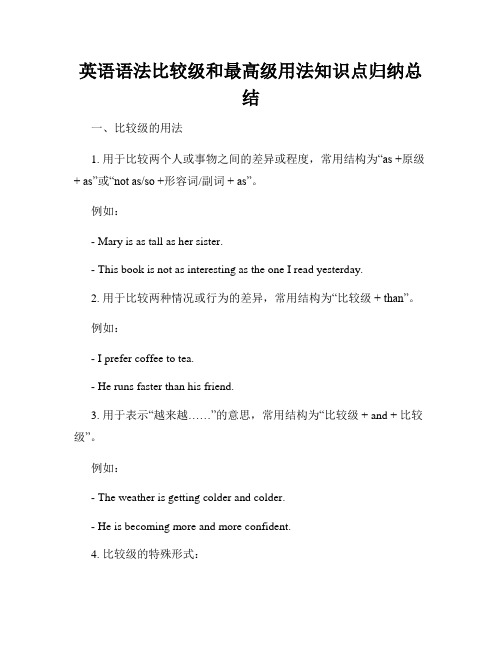
英语语法比较级和最高级用法知识点归纳总结一、比较级的用法1. 用于比较两个人或事物之间的差异或程度,常用结构为“as +原级+ as”或“not as/so +形容词/副词+ as”。
例如:- Mary is as tall as her sister.- This book is not as interesting as the one I read yesterday.2. 用于比较两种情况或行为的差异,常用结构为“比较级+ than”。
例如:- I prefer coffee to tea.- He runs faster than his friend.3. 用于表示“越来越……”的意思,常用结构为“比较级 + and + 比较级”。
例如:- The weather is getting colder and colder.- He is becoming more and more confident.4. 比较级的特殊形式:- 以字母e结尾的形容词,去掉e再加-er。
- 以重读闭音节结尾的单音节形容词和部分双音节形容词,直接加-er。
- 以“辅音字母+y”结尾的形容词,把y变成i再加-er。
例如:- nice → nicer- big → bigger- happy → happier二、最高级的用法1. 用于三个或三个以上人或事物之间的比较,表示最高程度,常用结构为“the + 最高级”。
例如:- She is the tallest girl in the class.- This is the most interesting book I've ever read.2. 最高级的特殊形式:- 以字母e结尾的形容词,去掉e再加-st。
- 以重读闭音节结尾的单音节形容词和部分双音节形容词,直接加-st。
- 以“辅音字母+y”结尾的形容词,把y变成i再加-est。
例如:- nice → nicest- big → biggest- happy → happiest三、比较级和最高级的不规则形式1. 比较级和最高级的不规则形式:good → better → best, bad → worse → worst, many/much → more → most, little → less→ least。
比较级和最高级句型
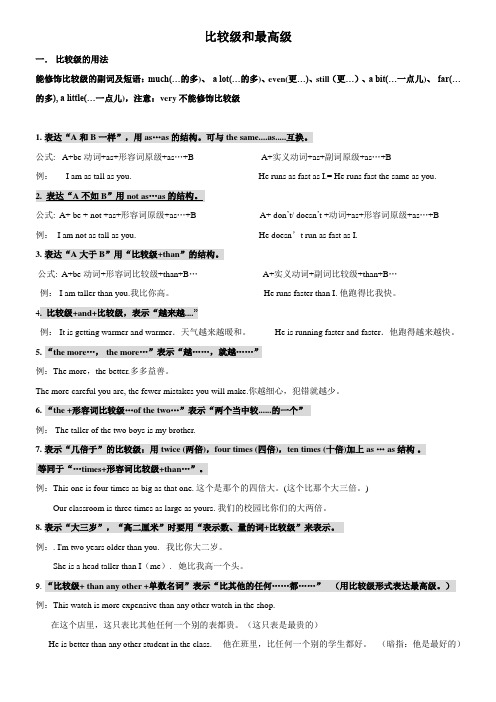
比较级和最高级一.比较级的用法能修饰比较级的副词及短语:much(…的多)、a lot(…的多)、even(更…)、still(更…)、a bit(…一点儿)、far(…的多), a little(…一点儿),注意:very不能修饰比较级1.表达“A和B一样”,用as…as的结构。
可与the same....as.....互换。
公式: A+be动词+as+形容词原级+as…+B A+实义动词+as+副词原级+as…+B例:I am as tall as you. He runs as fast as I.= He runs fast the same as you.公式: A+ be + not +as+形容词原级+as…+B A+ don’t/ doesn’t +动词+as+形容词原级+as…+B例: I am not as tall as you. He doesn’t run as fast as I.3.表达“A大于B”用“比较级+than”的结构。
公式: A+be动词+形容词比较级+than+B… A+实义动词+副词比较级+than+B…例: I am taller than you.我比你高。
He runs faster than I. 他跑得比我快。
4. 比较级+and+比较级,表示“越来越....”例: It is getting warmer and warmer.天气越来越暖和。
He is running faster and faster.他跑得越来越快。
5.“the more…, the more…”表示“越……,就越……”例:The more,the better.多多益善。
The more careful you are, the fewer mistakes you will make.你越细心,犯错就越少。
6.“the +形容词比较级…of the two…”表示“两个当中较......的一个”例: The taller of the two boys is my brother.7.表示“几倍于”的比较级:用twice (两倍),four times (四倍),ten times (十倍)加上as … as 结构。
比较级和最高级
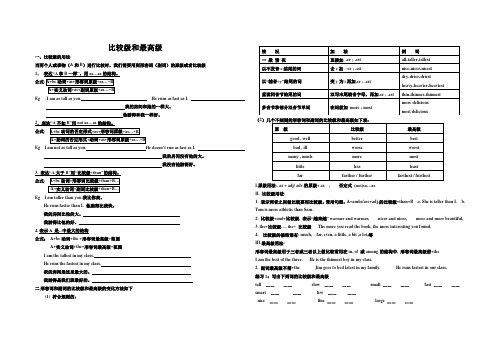
比较级和最高级一、比较级的用法:当两个人或事物(A和B)进行比较时,我们需要用到形容词(副词)的原级或者比较级1.表达“A和B一样”,用as…as的结构。
公式: A+be动词+as+形容词原级+as…+BA+实义动词+as+副词原级+as…+BEg I am as tall as you. He runs as fast as I.我的房间和她的一样大。
他游得和我一样好。
2.表达“A不如B”用not as…as的结构。
公式: A+be动词的否定形式+as+形容词原级+as…+BA+助词的否定形式+动词+as+形容词原级+as…+BEg I am not as tall as you. He doesn’t run as fast as I.我的房间没有他的大。
我没有他游得好。
3. 表达“A大于B”用“比较级+than”的结构。
公式: A+be动词+形容词比较级+than+B…A+实义动词+副词比较级+than+B…Eg I am taller than you.我比你高。
He runs faster than I. 他跑得比我快。
我的房间比他的大。
我游得比他的好。
4.表示A 是...中最大的结构公式:A+be动词+the +形容词最高级+范围A+实义动词+the+形容词最高级+范围I am the tallest in my class.He runs the fastest in my class.我的房间是这里最大的。
我游得是我们班最好的。
二.形容词和副词的比较级和最高级的变化方法如下(1) 符合规则的:(2)几个不规则的形容词和副词的比较级和最高级如下表:原级比较级最高级good , well better bestbad , ill worse worstmany , much more mostlittle less leastfar farther / further farthest / furthestI.原级用法:. as + adj/ adv.的原级+ as , 否定式(not)so…asII. 比较级用法:1. 表示两者之间做比较要用比较级。
形容词的比较级和最高级知识讲解及练习整理

形容词的比较级和最高级知识讲解及练习整理在英语学习中,形容词的比较级和最高级是非常重要的语法知识点。
它们用于描述事物之间的程度差异,让我们的表达更加准确和丰富。
接下来,让我们一起深入了解一下形容词的比较级和最高级的相关知识,并通过一些练习来巩固所学。
一、形容词比较级和最高级的构成规则1、一般情况下,直接在形容词词尾加 er 构成比较级,加 est 构成最高级。
比如:small smaller smallesttall taller tallest2、以不发音的字母e 结尾的形容词,直接在词尾加r 构成比较级,加 st 构成最高级。
例如:nice nicer nicestwide wider widest3、重读闭音节结尾且末尾只有一个辅音字母的形容词,要先双写这个辅音字母,然后再加 er 构成比较级,加 est 构成最高级。
比如:big bigger biggesthot hotter hottest4、以“辅音字母+y”结尾的形容词,要先把 y 变为 i,再加 er 构成比较级,加 est 构成最高级。
例如:happy happier happiestheavy heavier heaviest5、部分双音节和多音节形容词,在词前加 more 构成比较级,加most 构成最高级。
比如:beautiful more beautiful most beautifulimportant more important most important二、形容词比较级和最高级的用法1、比较级的用法表示两者之间的比较,常用“than”连接。
例如:He is taller than me(他比我高。
)可以用“much / a lot / far +比较级”表示“……得多”,“a little /a bit +比较级”表示“……一点儿”。
比如:This book is much more interesting than that one(这本书比那本有趣得多。
比较级和最高级的语法
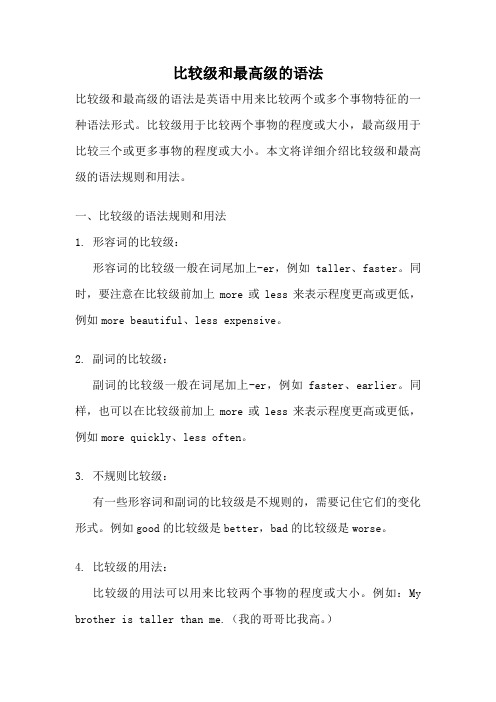
比较级和最高级的语法比较级和最高级的语法是英语中用来比较两个或多个事物特征的一种语法形式。
比较级用于比较两个事物的程度或大小,最高级用于比较三个或更多事物的程度或大小。
本文将详细介绍比较级和最高级的语法规则和用法。
一、比较级的语法规则和用法1. 形容词的比较级:形容词的比较级一般在词尾加上-er,例如taller、faster。
同时,要注意在比较级前加上more或less来表示程度更高或更低,例如more beautiful、less expensive。
2. 副词的比较级:副词的比较级一般在词尾加上-er,例如faster、earlier。
同样,也可以在比较级前加上more或less来表示程度更高或更低,例如more quickly、less often。
3. 不规则比较级:有一些形容词和副词的比较级是不规则的,需要记住它们的变化形式。
例如good的比较级是better,bad的比较级是worse。
4. 比较级的用法:比较级的用法可以用来比较两个事物的程度或大小。
例如:My brother is taller than me.(我的哥哥比我高。
)二、最高级的语法规则和用法1. 形容词的最高级:形容词的最高级一般在词尾加上-est,例如tallest、fastest。
同时,要注意在最高级前加上the来表示最高程度,例如the most beautiful、the least expensive。
2. 副词的最高级:副词的最高级一般在词尾加上-est,例如fastest、earliest。
同样,也可以在最高级前加上the来表示最高程度,例如the most quickly、the least often。
3. 不规则最高级:有一些形容词和副词的最高级是不规则的,需要记住它们的变化形式。
例如good的最高级是best,bad的最高级是worst。
4. 最高级的用法:最高级的用法可以用来比较三个或更多事物的程度或大小。
英语的比较级和最高级

• 答案选C。“否定词(尤其是never)+a+ 比较级”的意思是“从来没有……一个 更……的”,这类结构通常可视为在其后 省略了一个than…短语,做题时要注意根 据具体的语境作出正确的理解,如:I have never read a better article. 我从未读 过(比这篇文章)更好的文章(=这是我 所读过的最好的文章)。I have never seen a worse film. 我从没看过(比这部电 影)更糟的电影(=这是我所看过的最糟 的电影)。本题中的I’ve never heard a better one before的意思是“我从未听到 过(比你这个事故)更好听的事故”。
• 4. 定冠词或指示形容词+比较级+名词表示比较。 • The taller boy is John. • 那个身材较高的男孩子是约翰。
• 5. 有少数以ior结尾的形容词, 如inferior(次于), junior(年幼的; 下级的), posterior(之后), prior(之前), senior(年长的,上级 的), superior(优于)等本身就有比较的意思, 常与介系词to连用。 • This method is superior to that one. • 这种方法优于那种方法。
• 答案选D。由energy后的as可知, 此题是考查as…as…结构。根据英 语语法习惯,修饰as…as…结构的 副词只能置于as…as…结构之前, 不能置于其中。又如:Du Jiejie went out with a man twice as old as her. 杜姐姐和一个年龄比她大 一倍的男子来往。It cost three times as much as I had expected. 它花的钱比我预期的多两倍。
比较级和最高级和短语、句型
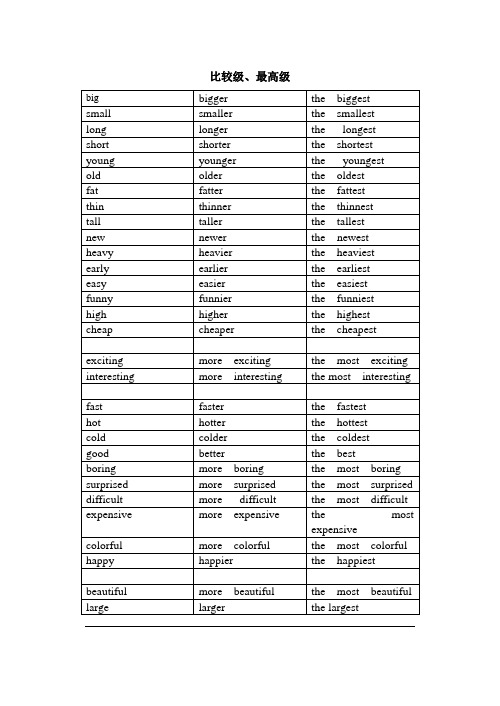
比较级、最高级疑问词:When where which which season which month which gamewhich sport which subject what who whose how many how muchHow long how old how tall how heavy表示时间的词usually always often some time hardly ever never表示过去时间的词this morning this afternoon this evening this noonlast morning last afternoon last evening last noon last year last monthlast week last Monday last Tuesday last Wednesday last Thursdaylast Friday last Saturday three years old three days old last Sundaythree mouths old the day before yesterday表示将来时间的词will: tomorrow next year next month next week next day next Sundaynext Monday next Tuesday next Wednesday next Thursdaynext Friday next Saturday表示时间的词today now every day twice a day every week every mouth every yearonce a year twice a mouth数词One1 two2 three3 four4 five5 six6 seven7 eight8 nine9 ten10 eleven11 twelve12 thirteen13 fourteen14 fifteen15 sixteen16 seventeen17 eighteen18 nineteen19 twenty20 twenty---one21 thirty30 forty40 fifty50 sixty60 seventy70 eighty80 ninety90one hundred100序数词first 1st second 2nd third 3rd fourth 4th fifth 5th sixth 6th seventh 7th eighth 8th ninth 9th tenth 10th eleventh 11th twelfth 12th thirteenth 13th fourteenth 14th fifteenth 15th sixteenth 16th eighteenth 18th nineteenth 19th twentieth 20thtwenty---first 21st thirtieth 30th thirty---first 31st星期Sunday Monday Tuesday Wednesday Thursday Friday Saturday月份January February March April May June July August September October November December人称代词I you he she it we you they物主代词my your his her its our your their mine yours his hers its ours yours theirs宾语me you him her its us you them Unit 1:1 I had a dream2 last night3 on Mars4 in /my/his/her dream5 in a spaceship6 in space7 many stars8 very cold9 had a lot of fun10 had a fun11 had a good time12 had some fun13 at home14 at school15 at the supermarket16 at the park17 at the bus station18 at the movie theater19 yesterday afternoon20 a good movie21 had an English class22 in the kitchen23on the moon24 from the earth25 this holiday 1 我做了一个梦2 昨晚3 在火星上4在我的/他的/她的梦里5 在宇宙飞船里6在太空7许多星星8非常冷9过的愉快10过的愉快11过的愉快12过的愉快13 在家14 在学校15 在超级市场16在公园17在公共汽车站18在电影院19昨天下午20一场好的电影21有一节英语课22在厨房23 在月球24来自地球25 这个假日26 in Beijing27 in a library28 yesterday evening29 last week30 In the hospital31 had no brother/sister32 had no money33 had no food for dinner34 lived with…..35 very poor36 very sad37 last SundayUnit 21 come in2 eat breakfast3 yesterday morning4 come to5 very quickly6 very slowly7 made a mess8 look sick9 on the back10 clean the table11 clean the house12 clean the class room13 clean my bedroom14 clean the floor15 visit my friend16 want a banana17 watch TV18 go home /went home19 go to school/went to school20 play football21 go to the supermarket22 eat lunch23 watch a movie24 see a movie 26 在北京27 在图书馆28 昨天晚上29 上周30在医院31没有兄妹32没有钱33晚餐没有食物34 和….一起居住35非常穷36 非常伤心37 上周日进来吃早饭昨天早晨来非常快非常快弄脏看上去病了后背擦桌子打扫房间打扫教室打扫卧室扫地看望我的朋友想要一个香蕉看电视回家去上学踢足球去超市吃午饭看电影看电影25 wash his dog26 wash my clothes27 go shopping /went shopping28 wash her socks29 listen to the radio30 listen to music31 the next day32 read the book33 on vacation34 do my homework35 every day36 go to the park37 had a picnic38 in my bedroom39 at seven thirty40 at eight o’clock41 in the evening42had a bad day43 go to Ken’s house44go swimming45go to the swimming pool46want to go swimming47 at last48 in the garden49 next to50 at the table51 look at52 clean my bedroom53 Mocky visit me54 go to Ken’s house55 play with my friendsUnit 31 in some races2 in a race3 win a/the race4 have a/the prize 25洗狗26洗我的衣服27购物28洗她的袜子29听收音机30听音乐31第二天32读书33在假日34做作业35每天36去公园37野餐38在我的卧室39在七点三十40在八点41在晚上42伤心的一天43去ken的房间44去游泳45去游泳池46想去游泳47在最后48在花园49旁边50在桌旁51看一看52打扫我的卧室53Mocky 看望我54去Ken的房子55和我的朋友玩1在一些比赛中2在一场比赛中3赢了一场比赛4有一个奖品5 jump high6 high jump7 win a/the prize8 very well9 in the frist race10 very fast11 very excited12 in the second race13 in the competition14 one hundred15 one thousand16 a swimming race17 climb up18 in front of19 knock at the door20 school sports day21walk into the house22on the table23 at the table24 had a swimming race25 after the race26 a glass of milk27 an hour28 I had a great time29 decided to do something30 after the race31 by bus32 a glass of milk33 an hour34 beforeAfterin the middlelast35went into the living room went into the bedroom went into the kitchen went into the bathroom36 I had a great time 5跳得高6跳高7赢了一个奖品8非常好9在第一场比赛里10非常快11非常激动12在第二场比赛里13在比赛里14一百15一千16一场游泳比赛17向上爬18在。
关于英语比较级和最高级的用法
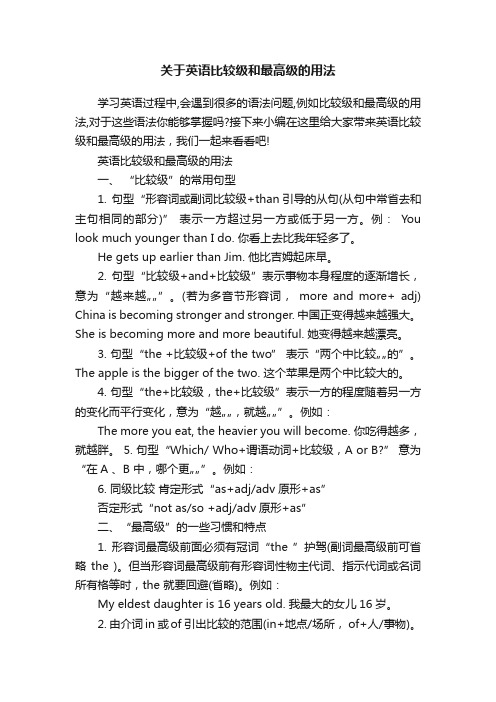
关于英语比较级和最高级的用法学习英语过程中,会遇到很多的语法问题,例如比较级和最高级的用法,对于这些语法你能够掌握吗?接下来小编在这里给大家带来英语比较级和最高级的用法,我们一起来看看吧!英语比较级和最高级的用法一、“比较级”的常用句型1. 句型“形容词或副词比较级+than引导的从句(从句中常省去和主句相同的部分)” 表示一方超过另一方或低于另一方。
例:You look much younger than I do. 你看上去比我年轻多了。
He gets up earlier than Jim. 他比吉姆起床早。
2. 句型“比较级+and+比较级”表示事物本身程度的逐渐增长,意为“越来越……”。
(若为多音节形容词,more and more+ adj) China is becoming stronger and stronger. 中国正变得越来越强大。
She is becoming more and more beautiful. 她变得越来越漂亮。
3. 句型“the +比较级+of the two” 表示“两个中比较……的”。
The apple is the bigger of the two. 这个苹果是两个中比较大的。
4. 句型“the+比较级,the+比较级”表示一方的程度随着另一方的变化而平行变化,意为“越……,就越……”。
例如:The more you eat, the heavier you will become. 你吃得越多,就越胖。
5. 句型“Which/ Who+谓语动词+比较级,A or B?” 意为“在A 、B 中,哪个更……”。
例如:6. 同级比较肯定形式“as+adj/adv 原形+as”否定形式“not as/so +adj/adv原形+as”二、“最高级”的一些习惯和特点1. 形容词最高级前面必须有冠词“the ”护驾(副词最高级前可省略the )。
但当形容词最高级前有形容词性物主代词、指示代词或名词所有格等时,the 就要回避(省略)。
常见比较级和最高级的用法归纳
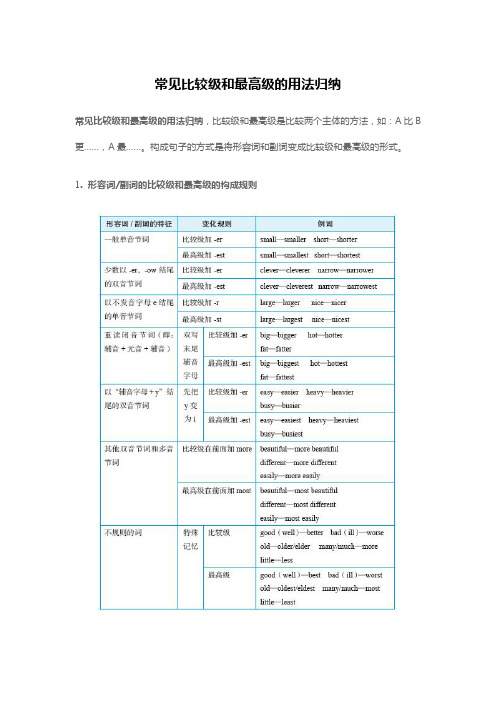
常见比较级和最高级的用法归纳常见比较级和最高级的用法归纳,比较级和最高级是比较两个主体的方法,如:A比B 更……,A最……。
构成句子的方式是将形容词和副词变成比较级和最高级的形式。
1. 形容词/副词的比较级和最高级的构成规则注意:形容词most前面如果没有the,就不表示最高级的含义,而是表示“非常”。
例句:It is a most important problem.语法:most前没有the,表示“非常”,该句还可以转化为:It is a very important problem.译文:它是一个非常重要的问题。
2. 形容词/副词比较级的用法(1)两者之间的比较,通常用连词than引导。
基本句型:“A+be/实义动词+形容词/副词比较级+than+B”,表示A比B更……。
例句:This train runs faster than that one.语法:faster是副词fast的比较级。
译文:这列火车比那列跑得更快。
(2)“less+原级(双音节和多音节)+than…”,表示“不如……”。
例句:Tim is less healthy than Tom.语法:less healthy than是“less+原级+than…”结构。
译文:提姆比汤姆体质要差。
(3)两者之间选择,其结构为:“which/who…+比较级,…or…?”例句:Which is bigger, the earth or the moon语法:bigger是big的比较级。
译文:地球和月亮哪个更大?(4)“比较级+and+比较级”,或“more and more+原级”表示“越来越……”。
例句:Shanghai is becoming more and more modern.语法:more and more modern为“more and more+原级”结构。
译文:上海正变得越来越现代化。
(5)“The+比较级,the+比较级”,表示“越……,越……”。
比较级和最高级用法

比较级和最高级用法比较级和最高级是英语中用来比较程度和大小的形式。
在句子中,它们通常用来对两个或多个事物进行比较。
本文将介绍比较级和最高级的用法及其句型结构。
一、比较级的用法比较级是用来表示两个事物之间的比较,一般由形容词或副词的原级加上-er构成。
有些形容词和副词的比较级形式并不是在词尾加-er,而是在前面加上more。
下面是比较级的用法:1. 对比两者之间的性质、特点等:- This book is longer than that one.(这本书比那本书长。
)- John runs faster than his brother.(约翰跑得比他的兄弟快。
)2. 表示两个事物之间的差异:- The weather is colder today than yesterday.(今天的天气比昨天冷。
)- I am happier now than before.(我现在比以前更快乐。
)3. 表示两个事物中的一个具有更高程度的某种性质:- Her dress is prettier than mine.(她的裙子比我的漂亮。
)- He works harder than anyone I know.(他比我认识的任何人都努力。
)二、最高级的用法最高级用来表示三个或以上事物之间的比较,一般由形容词或副词的原级加上-est构成。
有些形容词和副词的最高级形式并不是在词尾加-est,而是在前面加上most。
下面是最高级的用法:1. 对三个或以上事物之间的比较:- This is the longest bridge in the world.(这是世界上最长的桥。
) - She is the most talented singer in our city.(她是我们城市最有才华的歌手。
)2. 表示某个事物在某个方面属于最高程度:- She is the tallest girl in her class.(她是班上最高的女孩。
比较级最高级的用法和句型例句
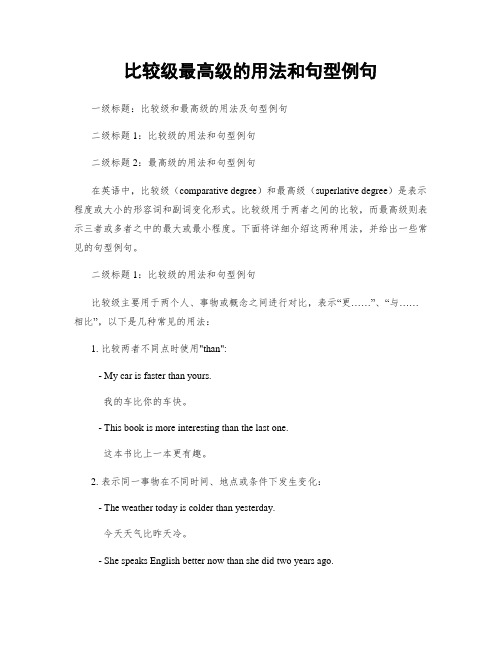
比较级最高级的用法和句型例句一级标题:比较级和最高级的用法及句型例句二级标题1:比较级的用法和句型例句二级标题2:最高级的用法和句型例句在英语中,比较级(comparative degree)和最高级(superlative degree)是表示程度或大小的形容词和副词变化形式。
比较级用于两者之间的比较,而最高级则表示三者或多者之中的最大或最小程度。
下面将详细介绍这两种用法,并给出一些常见的句型例句。
二级标题1:比较级的用法和句型例句比较级主要用于两个人、事物或概念之间进行对比,表示“更……”、“与……相比”,以下是几种常见的用法:1. 比较两者不同点时使用"than":- My car is faster than yours.我的车比你的车快。
- This book is more interesting than the last one.这本书比上一本更有趣。
2. 表示同一事物在不同时间、地点或条件下发生变化:- The weather today is colder than yesterday.今天天气比昨天冷。
- She speaks English better now than she did two years ago.她现在说英语说得比两年前好。
3. 表示程度或频率的变化:- Tom runs faster than his brother.汤姆比他哥哥跑得快。
- I study harder than before.我比以前更加努力学习。
4. 使用副词进行比较:- She sings more beautifully than anyone else.她唱得比任何人都要美妙。
- He works less efficiently than his colleagues.他工作效率不如同事们。
二级标题2:最高级的用法和句型例句最高级主要用于三个或更多人、事物或概念之间进行对比,表示“最……”、“一……中最”,以下是几种常见的用法:1. 使用定冠词"the" + 最高级形式:- He is the tallest boy in our class.他是我们班最高的男孩子。
形容词比较级和最高级的用法
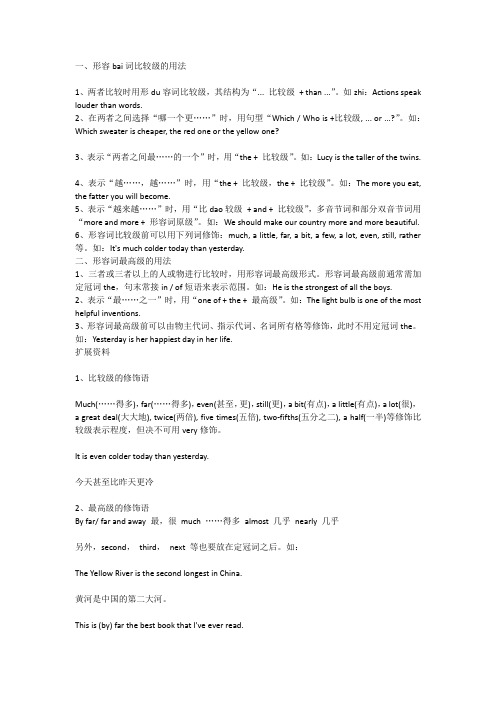
一、形容bai词比较级的用法1、两者比较时用形du容词比较级,其结构为“... 比较级+ than ...”。
如zhi:Actions speak louder than words.2、在两者之间选择“哪一个更……”时,用句型“Which / Who is +比较级, ... or ...?”。
如:Which sweater is cheaper, the red one or the yellow one?3、表示“两者之间最……的一个”时,用“the + 比较级”。
如:Lucy is the taller of the twins.4、表示“越……,越……”时,用“the + 比较级,the + 比较级”。
如:The more you eat, the fatter you will become.5、表示“越来越……”时,用“比dao较级+ and + 比较级”,多音节词和部分双音节词用“more and more + 形容词原级”。
如:We should make our country more and more beautiful.6、形容词比较级前可以用下列词修饰:much, a little, far, a bit, a few, a lot, even, still, rather 等。
如:It's much colder today than yesterday.二、形容词最高级的用法1、三者或三者以上的人或物进行比较时,用形容词最高级形式。
形容词最高级前通常需加定冠词the,句末常接in / of短语来表示范围。
如:He is the strongest of all the boys.2、表示“最……之一”时,用“one of + the + 最高级”。
如:The light bulb is one of the most helpful inventions.3、形容词最高级前可以由物主代词、指示代词、名词所有格等修饰,此时不用定冠词the。
比较级和最高级用法知识点总结
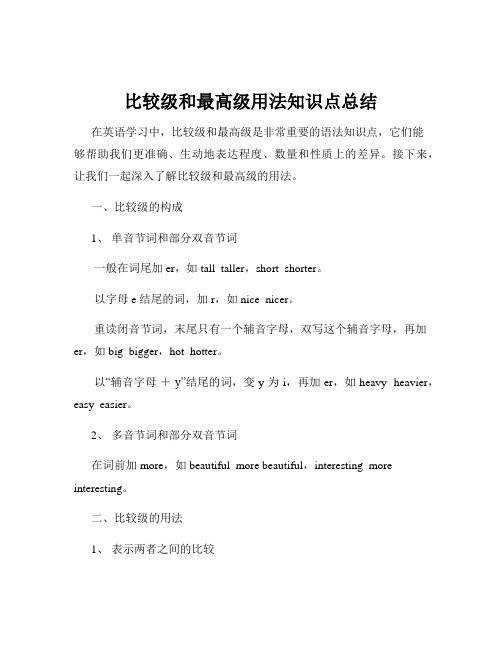
比较级和最高级用法知识点总结在英语学习中,比较级和最高级是非常重要的语法知识点,它们能够帮助我们更准确、生动地表达程度、数量和性质上的差异。
接下来,让我们一起深入了解比较级和最高级的用法。
一、比较级的构成1、单音节词和部分双音节词一般在词尾加 er,如 tall taller,short shorter。
以字母 e 结尾的词,加 r,如 nice nicer。
重读闭音节词,末尾只有一个辅音字母,双写这个辅音字母,再加er,如 big bigger,hot hotter。
以“辅音字母+y”结尾的词,变 y 为 i,再加 er,如 heavy heavier,easy easier。
2、多音节词和部分双音节词在词前加 more,如 beautiful more beautiful,interesting more interesting。
二、比较级的用法1、表示两者之间的比较A + be 动词+比较级+ than + B,如 He is taller than me (他比我高。
)A +实义动词+副词比较级+ than + B,如 She runs faster than him (她跑得比他快。
)2、比较级+ and +比较级,表示“越来越……”如 It's getting colder and colder (天气变得越来越冷。
)3、 The +比较级……,the +比较级……,表示“越……,越……”例如 The more you read, the more you know (你读得越多,知道得就越多。
)4、可以用 much、a little、a lot、even、far 等修饰比较级,加强程度例如 He is much taller than me (他比我高得多。
) She is a little fatter than before (她比以前胖了一点。
)三、最高级的构成1、单音节词和部分双音节词一般在词尾加 est,如 tall tallest,short shortest。
比较级和最高级的用法
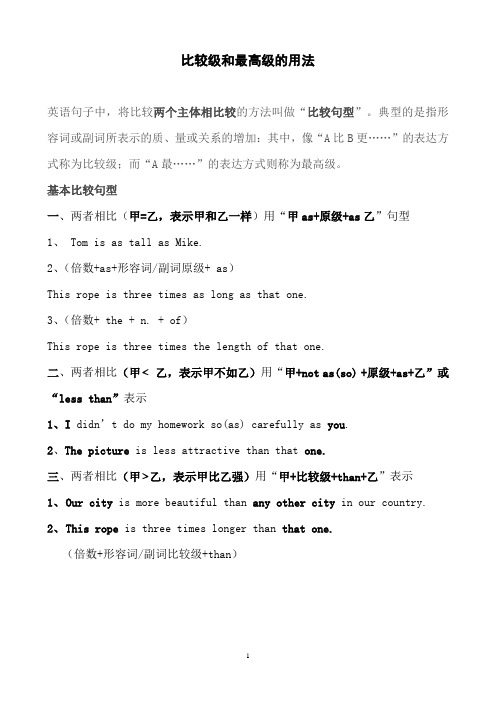
比较级和最高级的用法英语句子中,将比较两个主体相比较的方法叫做“比较句型”。
典型的是指形容词或副词所表示的质、量或关系的增加:其中,像“A比B更……”的表达方式称为比较级;而“A最……”的表达方式则称为最高级。
基本比较句型一、两者相比(甲=乙,表示甲和乙一样)用“甲as+原级+as乙”句型1、 Tom is as tall as Mike.2、(倍数+as+形容词/副词原级+ as)This rope is three times as long as that one.3、(倍数+ the + n. + of)This rope is three times the length of that one.二、两者相比(甲<乙,表示甲不如乙)用“甲+not as(so) +原级+as+乙”或“less than”表示1、I didn’t do my homework so(as) carefully as you.2、The picture is less attractive than that one.三、两者相比(甲>乙,表示甲比乙强)用“甲+比较级+than+乙”表示1、O ur city is more beautiful than any other city in our country.2、T his rope is three times longer than that one.(倍数+形容词/副词比较级+than)注意:①在含有连词than的比较级中,前后的比较对象必须是同一范畴,即同类事物之间的比较。
a)The population of Shanghai is larger than that of Beijing.b)It is easier to make a plan than to carry it out.c)His shirt is more expensive than mine(my shirt).(如果主语是物主代词+名词,那么后面要用名词性物主代词.)d)He is older than me.(than是介词,后面是人称代词时用宾格)e)Skiing is more exciting than skating. (比较对象可以是名词,短语,从句)②为了避免重复,在从句中常用one, that, those等词来代替前面提过的名词。
- 1、下载文档前请自行甄别文档内容的完整性,平台不提供额外的编辑、内容补充、找答案等附加服务。
- 2、"仅部分预览"的文档,不可在线预览部分如存在完整性等问题,可反馈申请退款(可完整预览的文档不适用该条件!)。
- 3、如文档侵犯您的权益,请联系客服反馈,我们会尽快为您处理(人工客服工作时间:9:00-18:30)。
比较级、最高级疑问词:When where which which season which month which gamewhich sport which subject what who whose how many how muchHow long how old how tall how heavy表示时间的词usually always often some time hardly ever never表示过去时间的词this morning this afternoon this evening this noonlast morning last afternoon last evening last noon last year last monthlast week last Monday last Tuesday last Wednesday last Thursdaylast Friday last Saturday three years old three days old last Sundaythree mouths old the day before yesterday表示将来时间的词will: tomorrow next year next month next week next day next Sundaynext Monday next Tuesday next Wednesday next Thursdaynext Friday next Saturday表示时间的词today now every day twice a day every week every mouth every yearonce a year twice a mouth数词One1 two2 three3 four4 five5 six6 seven7 eight8 nine9 ten10 eleven11 twelve12 thirteen13 fourteen14 fifteen15 sixteen16 seventeen17 eighteen18 nineteen19 twenty20 twenty---one21 thirty30 forty40 fifty50 sixty60 seventy70 eighty80 ninety90one hundred100序数词first 1st second 2nd third 3rd fourth 4th fifth 5th sixth 6th seventh 7th eighth 8th ninth 9th tenth 10th eleventh 11th twelfth 12th thirteenth 13th fourteenth 14th fifteenth 15th sixteenth 16th eighteenth 18th nineteenth 19th twentieth 20thtwenty---first 21st thirtieth 30th thirty---first 31st星期Sunday Monday Tuesday Wednesday Thursday Friday Saturday月份January February March April May June July August September October November December人称代词I you he she it we you they物主代词my your his her its our your their mine yours his hers its ours yours theirs宾语me you him her its us you them Unit 1:1 I had a dream2 last night3 on Mars4 in /my/his/her dream5 in a spaceship6 in space7 many stars8 very cold9 had a lot of fun10 had a fun11 had a good time12 had some fun13 at home14 at school15 at the supermarket16 at the park17 at the bus station18 at the movie theater19 yesterday afternoon20 a good movie21 had an English class22 in the kitchen23on the moon24 from the earth25 this holiday 1 我做了一个梦2 昨晚3 在火星上4在我的/他的/她的梦里5 在宇宙飞船里6在太空7许多星星8非常冷9过的愉快10过的愉快11过的愉快12过的愉快13 在家14 在学校15 在超级市场16在公园17在公共汽车站18在电影院19昨天下午20一场好的电影21有一节英语课22在厨房23 在月球24来自地球25 这个假日26 in Beijing27 in a library28 yesterday evening29 last week30 In the hospital31 had no brother/sister32 had no money33 had no food for dinner34 lived with…..35 very poor36 very sad37 last SundayUnit 21 come in2 eat breakfast3 yesterday morning4 come to5 very quickly6 very slowly7 made a mess8 look sick9 on the back10 clean the table11 clean the house12 clean the class room13 clean my bedroom14 clean the floor15 visit my friend16 want a banana17 watch TV18 go home /went home19 go to school/went to school20 play football21 go to the supermarket22 eat lunch23 watch a movie24 see a movie 26 在北京27 在图书馆28 昨天晚上29 上周30在医院31没有兄妹32没有钱33晚餐没有食物34 和….一起居住35非常穷36 非常伤心37 上周日进来吃早饭昨天早晨来非常快非常快弄脏看上去病了后背擦桌子打扫房间打扫教室打扫卧室扫地看望我的朋友想要一个香蕉看电视回家去上学踢足球去超市吃午饭看电影看电影25 wash his dog26 wash my clothes27 go shopping /went shopping28 wash her socks29 listen to the radio30 listen to music31 the next day32 read the book33 on vacation34 do my homework35 every day36 go to the park37 had a picnic38 in my bedroom39 at seven thirty40 at eight o’clock41 in the evening42had a bad day43 go to Ken’s house44go swimming45go to the swimming pool46want to go swimming47 at last48 in the garden49 next to50 at the table51 look at52 clean my bedroom53 Mocky visit me54 go to Ken’s house55 play with my friendsUnit 31 in some races2 in a race3 win a/the race4 have a/the prize 25洗狗26洗我的衣服27购物28洗她的袜子29听收音机30听音乐31第二天32读书33在假日34做作业35每天36去公园37野餐38在我的卧室39在七点三十40在八点41在晚上42伤心的一天43去ken的房间44去游泳45去游泳池46想去游泳47在最后48在花园49旁边50在桌旁51看一看52打扫我的卧室53Mocky 看望我54去Ken的房子55和我的朋友玩1在一些比赛中2在一场比赛中3赢了一场比赛4有一个奖品5 jump high6 high jump7 win a/the prize8 very well9 in the frist race10 very fast11 very excited12 in the second race13 in the competition14 one hundred15 one thousand16 a swimming race17 climb up18 in front of19 knock at the door20 school sports day21walk into the house22on the table23 at the table24 had a swimming race25 after the race26 a glass of milk27 an hour28 I had a great time29 decided to do something30 after the race31 by bus32 a glass of milk33 an hour34 beforeAfterin the middlelast35went into the living room went into the bedroom went into the kitchen went into the bathroom36 I had a great time 5跳得高6跳高7赢了一个奖品8非常好9在第一场比赛里10非常快11非常激动12在第二场比赛里13在比赛里14一百15一千16一场游泳比赛17向上爬18在。
